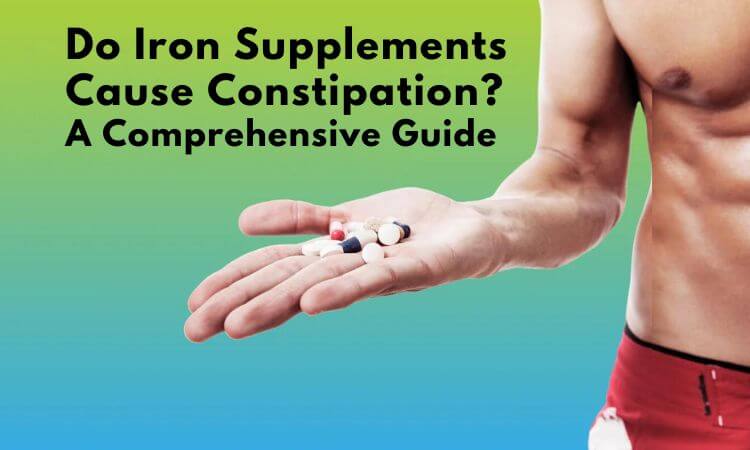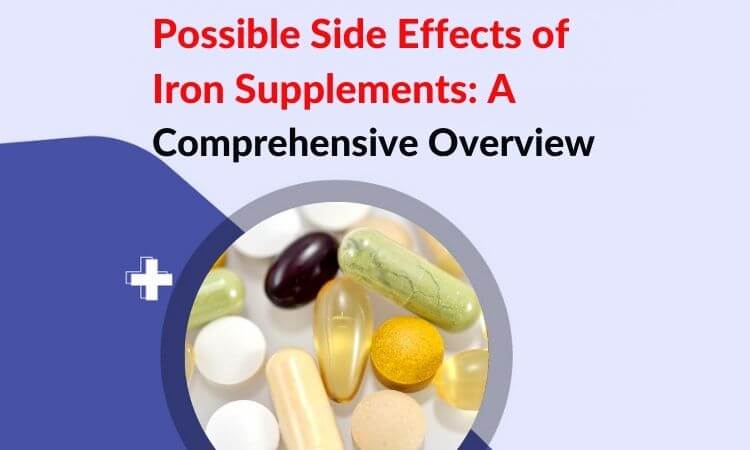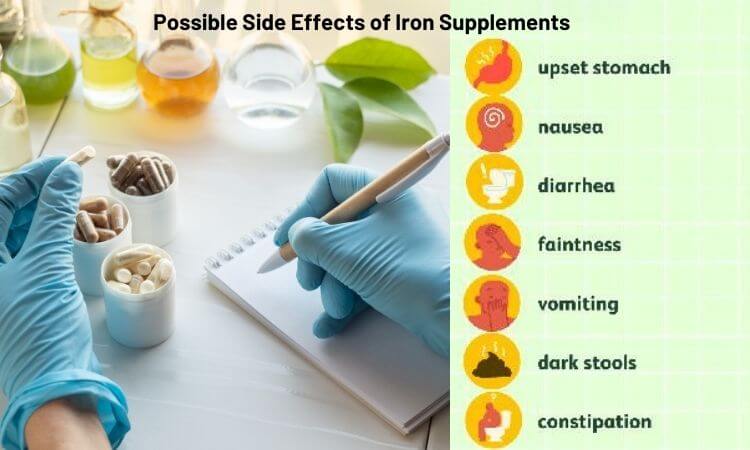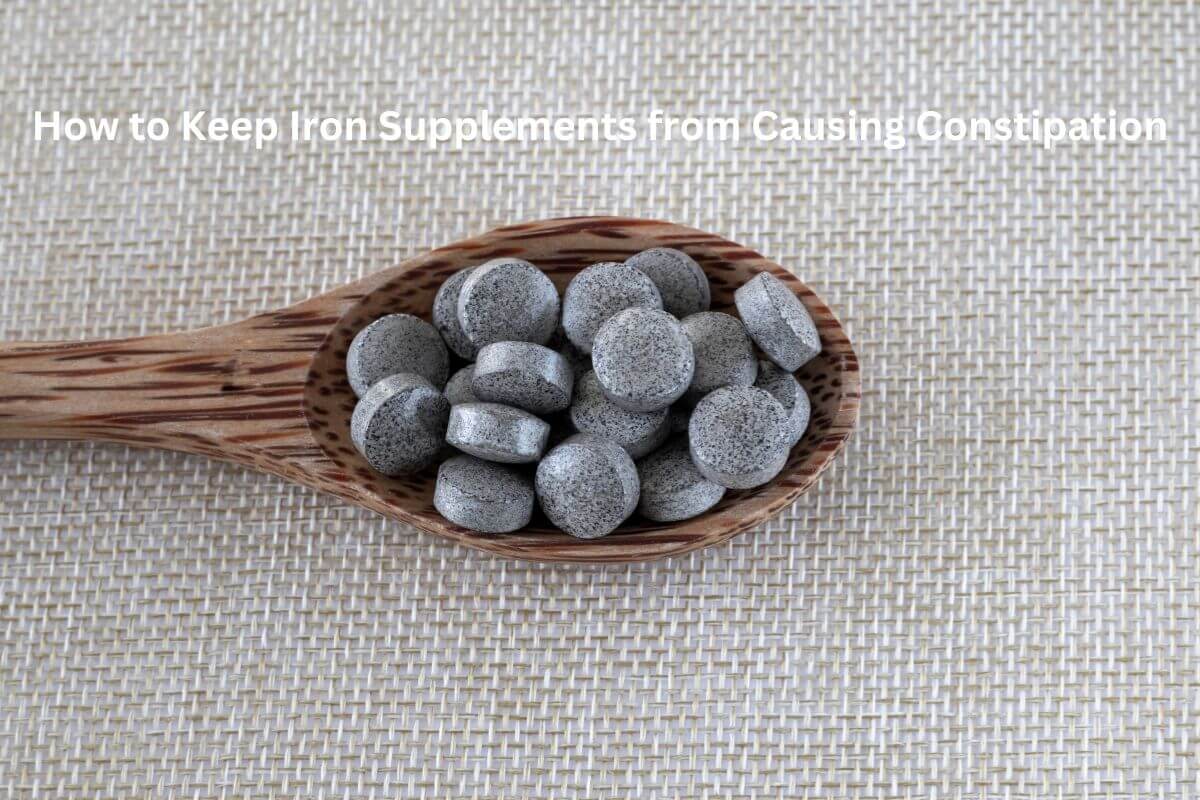To keep iron supplements from causing constipation, take them with plenty of water and consume a high-fiber diet. Split the dose throughout the day to minimize side effects.
Iron supplements can sometimes cause constipation, which is a common concern. Consuming adequate water helps to soften stools, making them easier to pass. A diet rich in fiber, including fruits, vegetables, and whole grains, aids in digestion and prevents constipation.
Splitting the iron dose into smaller amounts throughout the day can also reduce gastrointestinal discomfort. Opt for iron supplements that contain a stool softener or consider liquid iron, which may be gentler on the stomach. Always consult with a healthcare provider for personalized advice tailored to your specific needs.
Iron Supplements And Digestive Health
Iron supplements are essential for many individuals, especially those with iron deficiency anemia. However, they often cause digestive issues. One common side effect is constipation, which can be uncomfortable and frustrating. Understanding how iron affects digestion can help manage these symptoms.
The Link Between Iron And Constipation
Iron supplements can be hard on the digestive system. They can slow down bowel movements. This leads to constipation.
Iron changes the balance of bacteria in the gut. This can cause a backup in the intestines.
Non-heme iron found in supplements is harder to absorb. This makes the digestive system work harder.
Why Some People Are More Susceptible
Not everyone experiences constipation from iron supplements. Some people are more sensitive.
Individuals with slower digestion are more likely to get constipated. Their bodies take longer to process iron.
People with pre-existing digestive issues like IBS are also more susceptible. Their digestive systems are already compromised.
Pregnant women often take higher doses of iron. This increases the chance of constipation.
| Group | Reason for Susceptibility |
| Individuals with slow digestion | Longer time to process iron |
| People with digestive issues | Compromised digestive system |
| Pregnant women | Higher doses of iron |
Identifying Constipation Symptoms
Iron supplements are essential for many people. They help to increase iron levels in the body. But sometimes, they can cause constipation. Knowing the symptoms can help you manage it better.
Common Signs Of Constipation
Constipation symptoms are easy to recognize. Here are some common signs:
- Hard and dry stools that are difficult to pass.
- Less than three bowel movements a week.
- Straining during bowel movements.
- The feeling of incomplete evacuation.
- Abdominal pain or discomfort.
- Feeling bloated or having a swollen abdomen.
When To Seek Medical Advice
Sometimes, constipation can be serious. Seek medical advice if you experience any of the following:
- Severe pain in your abdomen.
- Blood in your stool.
- Unintended weight loss.
- Persistent constipation lasting more than three weeks.
- Vomiting or nausea.
The Role Of Iron Formulation
Iron supplements are essential for addressing iron deficiency and anemia. They can sometimes cause constipation, though. The formulation of iron supplements plays a key role in minimizing this side effect. Understanding the different types of iron supplements and choosing the right one can help keep your digestive system comfortable.
Different Types Of Iron Supplements
Iron supplements come in various forms. Each form affects the body differently. Knowing these differences helps you select the right supplement for you.
- Ferrous Sulfate: This is a common and affordable form of iron. It is effective but can cause constipation in some people.
- Ferrous Gluconate: This form is gentler on the stomach. It may cause fewer digestive issues.
- Ferrous Fumarate: This form has a higher iron content. It is effective but may cause more gastrointestinal issues.
- Iron Bisglycinate: This chelated form is gentle on the stomach and less likely to cause constipation.
Choosing The Right Form For You
Choosing the right form of iron supplement depends on individual needs. Here are some tips to help you decide:
- Consult a Doctor: Always consult a healthcare provider before starting any supplement. They can guide you based on your specific health needs.
- Consider Your Tolerance: If you have a sensitive stomach, opt for gentler forms like ferrous gluconate or iron bis-glycinate.
- Check Absorption Rates: Some forms of iron are absorbed better than others. This can affect their effectiveness.
- Monitor Side Effects: Pay attention to how your body reacts. If constipation occurs, consider switching forms.
Below is a table summarizing the types of iron supplements and their characteristics:
| Type of Iron | Characteristics |
| Ferrous Sulfate | Common, affordable, may cause constipation |
| Ferrous Gluconate | Gentler on the stomach, fewer digestive issues |
| Ferrous Fumarate | High iron content may cause gastrointestinal issues |
| Iron Bisglycinate | Chelated, gentle, less likely to cause constipation |

Dietary Strategies To Prevent Constipation
Iron supplements can help boost your iron levels. But they often cause constipation. This can be avoided by making smart dietary choices. Here are some strategies to help keep things moving smoothly.
Fiber-rich Foods To Include
Eating fiber-rich foods can help prevent constipation. Fiber adds bulk to your stool and makes it easier to pass. Here are some high-fiber foods to include in your diet:
- Fruits: Apples, bananas, oranges, and berries
- Vegetables: Carrots, broccoli, and leafy greens
- Whole grains: Brown rice, oats, and whole wheat bread
- Legumes: Lentils, beans, and chickpeas
- Nuts and seeds: Almonds, chia seeds, and flaxseeds
These foods can help keep your digestive system healthy. Try to include them in your daily meals.
Hydration: Water Intake Recommendations
Drinking enough water is crucial for preventing constipation. Water helps soften your stool, making it easier to pass. Here are some water intake recommendations:
| Age Group | Daily Water Intake |
| Children (4-8 years) | 5 cups (1.2 liters) |
| Children (9-13 years) | 7-8 cups (1.6-1.9 liters) |
| Teens (14-18 years) | 8-11 cups (1.9-2.6 liters) |
| Adults | 8-10 cups (1.9-2.4 liters) |
Carry a water bottle with you. Take small sips throughout the day to help you meet your water intake goals.
By including fiber-rich foods and staying hydrated, you can help prevent constipation. These simple dietary changes can make a big difference in your comfort and health.
Supplement Timing And Dosage
Taking iron supplements can sometimes cause constipation. Knowing the right time and dosage can help avoid this problem. This section will cover the best times to take iron supplements and how to adjust the dosage to minimize side effects.
Best Times To Take Iron Supplements
Timing is key to reducing side effects from iron supplements. Here are some tips:
- Take iron supplements on an empty stomach for better absorption.
- If the supplement upsets your stomach, take it with a small amount of food.
- Avoid taking iron with dairy products or caffeine. These can hinder absorption.
- Take iron supplements in the morning. This can help you avoid constipation.
Adjusting Dosage To Minimize Side Effects
Adjusting the dosage can also help reduce constipation. Follow these guidelines:
- Start with a lower dose to see how your body reacts.
- Gradually increase the dosage as needed.
- Consult with a healthcare provider to find the right dose for you.
- Split the dosage throughout the day to avoid taking too much at once.
| Time | Dosage |
| Morning | Half dose |
| Afternoon | Half dose |
By following these tips, you can minimize the risk of constipation while taking iron supplements. Always consult with your healthcare provider for personalized advice.
The Importance Of Probiotics
Iron supplements often cause constipation. Probiotics can help. They improve gut health and make digestion smoother. This helps avoid constipation.
Probiotics are good bacteria that live in your gut. They help break down food and keep bad bacteria away, which is key for avoiding constipation.
Selecting Probiotic Strains
Not all probiotics are the same. Different strains help in different ways, and some strains are better for digestion.
| Probiotic Strain | Benefit |
| Lactobacillus acidophilus | Helps break down lactose and ease digestion |
| Bifidobacterium longum | Reduces gut inflammation and improves stool consistency |
| Lactobacillus rhamnosus | Boosts overall gut health and reduces constipation |
Probiotics: Pills Vs. Natural Sources
You can get probiotics from pills or natural sources. Each has its benefits.
- Pills: Easy to take. Consistent dosage.
- Natural Sources: Found in foods. Tasty and nutritious.
Natural sources of probiotics include:
- Yogurt: Rich in Lactobacillus
- Kefir: Packed with multiple strains
- Kimchi: Contains Lactobacillus and other good bacteria
- Pickles: Fermented and full of probiotics
Choose the option that works best for you. Both can help reduce constipation from iron supplements.
Lifestyle Modifications For Improved Digestion
Iron supplements can sometimes cause constipation. Simple lifestyle changes can help improve digestion and reduce this side effect. Below are some effective methods to enhance your digestive health.
Regular Exercise Benefits
Regular exercise boosts overall health. It helps your digestive system work better. Physical activities like walking, jogging, or yoga can stimulate bowel movements. Aim for at least 30 minutes of moderate exercise each day. You can break this into shorter sessions if needed.
Exercise increases blood flow to the intestines, helping them move waste more efficiently. It also reduces the time it takes for food to move through the large intestine, limiting water absorption from the stool and making it easier to pass.
Stress Management Techniques
Stress can negatively impact digestion. High-stress levels can slow digestive processes, leading to constipation. Effective stress management techniques are essential for maintaining healthy digestion.
- Deep Breathing Exercises: Practice deep breathing to calm your mind and body. This can help reduce stress levels.
- Meditation: Spend 10-15 minutes each day meditating. This helps in reducing overall stress.
- Mindfulness: Pay attention to your body and mind. This can help you manage stress better.
Incorporate these techniques into your daily routine. They can help improve your digestive health and reduce the risk of constipation.

Medical Interventions And Alternatives
Many people face constipation due to iron supplements. This can be both uncomfortable and frustrating. Medical interventions and alternatives can help manage this side effect.
When To Consider Laxatives
If constipation becomes severe, a doctor may suggest laxatives. These can help to ease bowel movements and provide relief. Over-the-counter laxatives are often the first choice. They include:
- Stool softeners
- Fiber supplements
- Osmotic laxatives
It’s important to use laxatives under medical supervision. Long-term use can lead to dependency and worsen constipation. A doctor may also recommend a specific type based on the individual’s condition.
Alternative Treatments And Supplements
Some people may prefer alternative treatments to manage constipation. These methods can be effective and often have fewer side effects. Consider the following alternatives:
- Increase Fiber Intake: Foods high in fiber can help. Examples include fruits, vegetables, and whole grains.
- Hydration: Drinking more water can soften stools. Aim for at least 8 glasses a day.
- Probiotics: These can improve gut health. Yogurt and fermented foods are good sources.
Some may prefer alternative iron supplements that are gentler on the stomach. These include:
| Supplement Type | Benefits |
| Iron Bisglycinate | Less likely to cause constipation |
| Liquid Iron | Easy to digest and absorb |
| Slow-release Iron | Reduced gastrointestinal issues |
Always consult with a healthcare provider before switching supplements. This ensures that the new supplement meets your needs.
Monitoring Your Body’s Response
Iron supplements can sometimes cause constipation. Monitoring your body’s response is crucial, as this helps you take action quickly.
Keeping A Symptom Diary
Track your symptoms daily. Write down any changes in your bowel movements. Note if you feel bloated or uncomfortable.
Use a simple table to keep track:
| Day | Symptoms | Severity (1-10) |
| Monday | Normal | 1 |
| Tuesday | Constipated | 6 |
This helps you see patterns. You can share this information with your doctor.
Adjusting Your Regimen Accordingly
Based on your diary, you may need to adjust your iron supplement dosage. It would help if you increased your water intake. Eating more fiber-rich foods can also help.
Here are some fiber-rich foods:
- Beans
- Whole grains
- Fruits
- Vegetables
If symptoms persist, consult your doctor. They might recommend a different type of iron supplement. Always listen to your body and take notes.

Collaborating With Healthcare Providers
Iron supplements can often cause constipation, a common side effect. Collaborating with healthcare providers can help manage this issue effectively. By working closely with professionals, you can find the right balance and ensure your iron intake is optimal without discomfort.
Communicating With Your Doctor
Always inform your doctor about any side effects from iron supplements. They can adjust your dosage or suggest different formulations. Clear communication is crucial for effective treatment. Be honest about your symptoms.
Ask your doctor about slow-release iron supplements. These can reduce the risk of constipation. Discuss any other medications you are taking to avoid interactions.
Regular check-ups allow your doctor to monitor your progress. This ensures your iron levels are stable without causing severe constipation.
Seeking Nutritional Expertise
Consult a nutritionist to balance your diet with iron-rich foods. They can provide a meal plan that includes foods less likely to cause constipation.
Nutritionists can recommend fiber-rich foods to help prevent constipation. Here are some fiber-rich foods:
- Fruits like apples and oranges
- Vegetables such as broccoli and spinach
- Whole grains like oatmeal and brown rice
Hydration is key. Nutritionists often advise increasing water intake. Drinking plenty of water helps soften stools, making it easier to pass.
Probiotics can also help. Discuss with your nutritionist the inclusion of probiotics in your diet.
| Action | Benefit |
| Adjusting Iron Dosage | Reduces the likelihood of constipation |
| Including Fiber-Rich Foods | Helps in regular bowel movements |
| Staying Hydrated | Softens stool and eases constipation |
| Taking Probiotics | Improves gut health |
Frequently Asked Questions
How Do You Stop Constipation When Taking Iron Tablets?
Take iron tablets with food, drink plenty of water, eat fiber-rich foods like fruits, vegetables, and whole grains, exercise regularly, and consult your doctor for alternatives if constipation persists.
Is There An Iron Supplement That Doesn’t Cause Constipation?
Yes, there are iron supplements like ferrous bis-glycinate that are less likely to cause constipation. Always consult your doctor.
When Should I Take Iron, Morning Or Night?
For best absorption, take iron supplements in the morning on an empty stomach. Avoid taking them with dairy or caffeine.
Does Black Poop Mean Iron Tablets Are Working?
Yes, black poop can indicate that iron tablets are working. The color change is due to unabsorbed iron.
Conclusion
To prevent constipation from iron supplements, stay hydrated and eat fiber-rich foods. Choose gentle iron formulations and consult your doctor. Implementing these tips can enhance your iron intake without discomfort. Prioritize your digestive health while benefiting from essential nutrients. Make these small changes for a smoother experience with iron supplements.

“As the voice behind Radiant Glow Health, we are dedicated to being your ultimate wellness and vitality companion. Our mission is to inspire and guide you on your journey to a healthier and more vibrant life. Join us as we explore holistic health practices and empower you to radiate wellness from within.”



